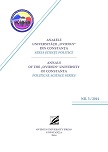Traditions Identity and Social Institutions in Dobrogea (1880-1920)
Traditions Identity and Social Institutions in Dobrogea (1880-1920)
Author(s): Enache TușaSubject(s): Politics / Political Sciences
Published by: Ovidius University Press
Keywords: identity; ethnicity; traditions; social communities; acculturation
Summary/Abstract: At the level of Romanian anthropological research, the methodological cooperation between social anthropology (ethnology) and sociological research, revolves around two aspects of community development: the greatness of the rural world at a historical scale and the persistence of an important rural element in the Dobrogean space up to the present. There were particular events like marriage or birth and also long periods where nothing was happening, where the time passed without any irregularity in the community. Joys and difficult times, feasts and dramatic moments, fidelity and infidelity represented something extremely important for every family. This way, families tended to be organized traditionally and there were few situations when newlyweds decided to leave their families in order to make a new living for themselves. Usually, the newlywed had a dwelling in the community, close to other relatives on the same street, near to the basic family. Mixed marriages were very rare exceptions or they were attributed to the assimilation of a small group by a larger one – a rare happening in Dobrogea. A history of the couple is yet to be fundamentally researched for the Dobrogean space. As such, we can attest that marriage did not represent only a social and sentimental engagement, but was an element of cohesion within families and communities.
Journal: Annals of the Ovidius University of Constanta - Political Science Series
- Issue Year: 3/2014
- Issue No: 1
- Page Range: 7-24
- Page Count: 18
- Language: English

